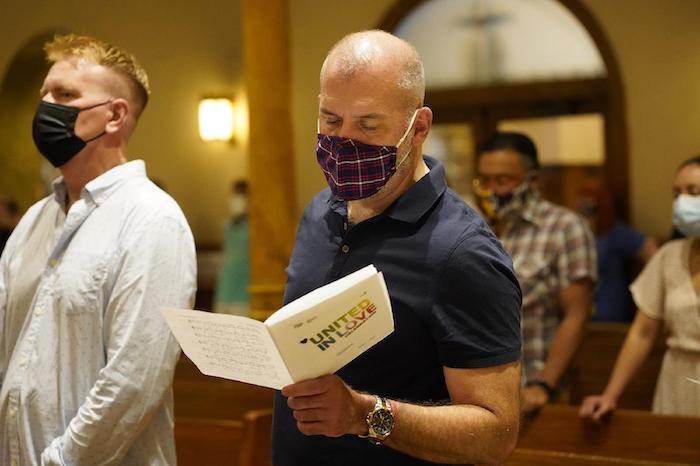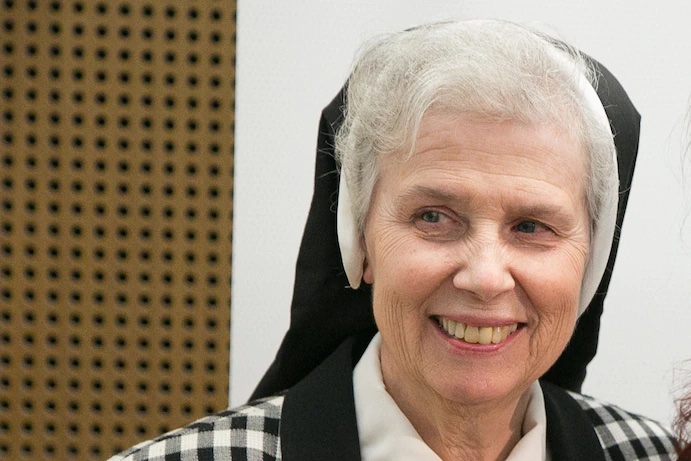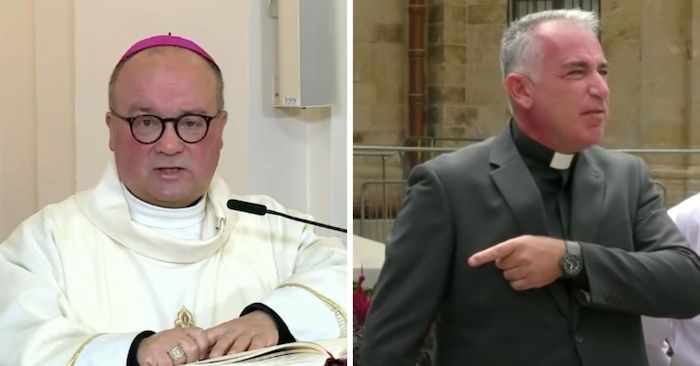
Is the Church beginning to decisively shift its approach on LGBTQ matters?
Pope Francis has not formally “changed” any official teaching but he’s opened the way to a more inclusive and pastoral approach to gay and lesbian people, and his letters encouraging those ministering to them are highly significant. It is the opening of a more “synodal” approach to this issue, where the Church listens, learns and opens up new pastoral avenues. Personnel changes at the Vatican’s doctrine office, announced on 10 January, also suggest movements are afoot.
The latest letter to emerge from Francis was sent to Sister Jeanine Gramick, one of the founders of New Ways Ministry, a US-based support group for LGBTQ Catholics, in which he praises her work. It comes despite a 1999 ruling by the Holy See’s Congregation for the Doctrine of the Faith (CDF) which ordered her and Fr Robert Nugent to be “permanently prohibited” from pastoral work with gay people.
By endorsing the 50-year ministry of Sr Jeanine, Francis has effectively overturned this earlier censure, while his support for same-sex civil unions also supersedes the CDF’s 2003 document which declared that the “state could not grant legal standing to such unions”. In short, the Francis pontificate has made decisive steps in removing the “anti-gay” perception of the Church.
Fr James Martin, a Jesuit priest and writer who ministers to gay Catholics, says that while the Pope has not changed teaching he has “certainly changed the tone, the approach and the conversation around the issue.” Fr Martin has received his own letter from the Pope, which was the first written papal endorsement of a priest’s ministry to LGBTQ Catholics.
“Remember that the Holy Father has just praised a Catholic sister who had been under Vatican censure. This could be the beginning of what church historians call a ‘rehabilitation’. You could also argue that a change in tone is a kind of change in teaching. And the new teaching could be said to be, LGBTQ Catholics are worth listening to and ministering to,” the Jesuit priest explained.
It could be argued the Pope’s letters and comments have little weight unless they are backed up with official rulings, and point out that last year he gave his approval to a CDF document blocking the possibility of the Church blessing same-sex couples.
Yet the Pope is demonstrating that official rulings alone are not enough to settle a contested issue. Time, as Francis says, is greater than space, and reality is more important than ideas. The critical test for any doctrine is how it is received by the Church community, and the Pope’s response opens up a space for the conversation to continue.
The winds of change are now blowing through the Vatican’s doctrine department, for so long the office which produced harsh rulings on the gay issue.
The Vatican has announced the Pope had decided to move the CDF official widely believed to be responsible for the document banning same-sex blessings out of his position. Archbishop Giacomo Morandi will now become the leader of the Diocese of Reggio Emilia-Guastalla, in Northern Italy.
While Francis approved the ruling on blessing same-sex unions, he later distanced himself from the language in the document and it was reported he would return to the issue at a later date.
Meanwhile, Archbishop Charles Scicluna, who leads the Archdiocese of Malta alongside working as a high ranking CDF official, has recently issued a formal warning to a priest for making homophobic comments. It appears to be the first time someone from the doctrine office has formally condemned homophobia.
At a broader level, the synod is also starting to have an impact and by throwing open the process to a broad range of voices it has already allowed small, yet historic, shifts to take place.
One of these came with the decision of the Synod of Bishops’ office in Rome to include both New Ways Ministry and Discerning Deacons, an English-language forum for discussion about the restoration of the female diaconate, on its resources page.
But this almost didn’t happen. A New Ways Ministry video, “From the Margins to the Center: a Webinar on LGBTQ Catholics and Synodality”, was removed from the synod office’s website after it had been made aware that New Ways Ministry had been censured by the US bishops’ conference a decade ago for its support of civil marriage for same-sex couples. The synod office then reversed its decision and apologised “for the pain caused” in what is the first time a Vatican official had apologised to LGBT Catholics.
The apology came after details of other letters that the Pope had sent to New Ways praising the group’s work and described their co-founder, Sister Jeannine Gramick, as a “valiant woman”. Francis also thanked Francis DeBernardo, the executive director of New Ways, for telling him the “full story” of the group as “sometimes we receive partial information about people and organisations.”
The rehabilitation of New Ways Ministry may seem like a small thing. Yet the apology and the Pope’s letters show a Church willing to listen and to learn from marginalised voices.
Sr Jeanine’s response to Francis’ letter and the 11-year investigation she faced also offers a model for what a synodal Church with different viewpoints looks like. She told America that when she received the correspondence from the Pope, she thought of the scripture from John’s Gospel: “I do not call you servants, I call you friends.”
Sr Jeanine added: “That’s how I felt, like I was getting a letter from a friend…I think that’s how Pope Francis wants us to live. And it’s what I hope we would be as a people of God: a community of friends.”
Even though she disagreed with Cardinal Joseph Ratzinger, who oversaw the investigation into New Ways as prefect of the Vatican doctrine office, Sr Jeanine said she respected him as a “holy man” who believed he was doing the right thing.
“Cardinal Ratzinger is way out there on one branch, and I am way out there on a branch probably 180 degrees around that tree,” she said. “We couldn’t have been farther apart in our theological thinking. But we are rooted in that one tree. We have a common faith in Christ, and that’s what draws us together. We’re all around that tree somewhere.”
When it comes to LGBT Catholics, the tree is slowly being pruned and starting to bear new fruit.
Complete Article ↪HERE↩!




